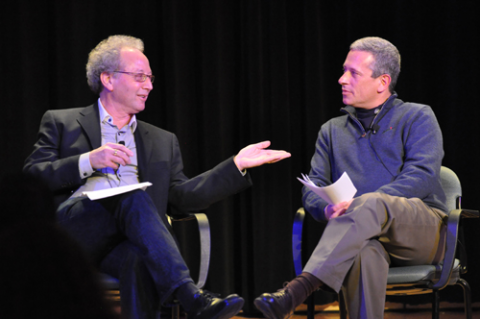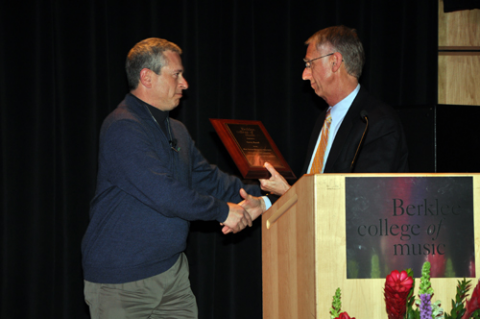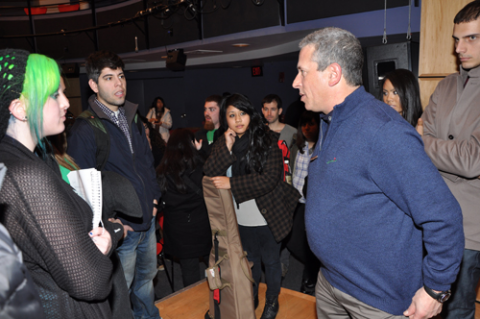Zafris Lecture: Live Nation COO Gerry Barad

Gerry Barad, COO of Live Nation Global Touring, presents the 2010 Zafris Distinguished Lecture Series for Music Business/Management.
Photo by Phil Farnsworth

Rather than a standard lecture, the talk was an interview by music business/management professor Jeff Dorenfeld.
Photo by Phil Farnsworth

Don Gorder, Music Business/Management Department chair, presents Barad with a plaque of appreciation.
Photo by Phil Farnsworth

Barad, who made a donation to Berklee's scholarship fund, speaks to students after the lecture.
Photo by Phil Farnsworth
In the 17 years Berklee's Zafris Lecture has been held, nearly every aspect of the music industry has been represented, including record company executives, music publishers, artist management, and trade organizations. "But, ironically, the one area that we've missed is the one that's been around the longest, " said Music Business/Management Department chair Don Gorder. This year, that omission was rectified by Gerry Barad, chief operating officer of Live Nation Global Touring, as he took students behind the scenes of promoting and ticketing some of the largest tours in the world.
Barad's main piece of advice for Berklee students? "Luck is hard work in disguise." The music industry executive explained the challenges he faced starting out in the '70s, when each city had its own promoter who jealously guarded his/her territory. He broke in through the punk scene, booking venues that people wouldn't expect, such as legion halls.
Barad eventually cofounded a merchandising company, then moved to England and started buying global merchandising rights. "We realized, if we can do the merchandising worldwide, why can't we do the tours worldwide?" Barad said. "And that's where it all started."
"All" includes tours for Madonna, Lady Gaga, and U2—the last of which, in the Boston area at least, saturated all forms of media for days.
Barad set the tone of the Q&A with professor Jeff Dorenfeld by quoting Prince from several years ago at Massey Hall in Toronto: "If you're here to get your 'Purple Rain' on, you're in the wrong house. It's not what you know, it's what you're willing to learn."
On Sponsorship Deals
Asked about sponsorship, Barad talked about the very successful tie-ins and sponsorships for the last two U2 tours—and was very clear on the difference between the two. For the first tour, Apple used U2's "Vertigo" in its iPod commercials, spending more than $100 million. Said Barad, "It was not a sponsorship deal—we never received any money for the tour for it—but they spent a ton of money launching their product, and the song was in your head from day one."
U2's most recent tour was their first to have a tour sponsor: Blackberry. In addition to paying for the privilege, said Barad, the company "spent a lot of money on media, and they created an image we thought was really good, the 'Blackberry Loves U2' thing. It looked like our commercial as opposed to their commercial."
"I've always subscribed to the measured media," said Barad. "Forget how much cash you're giving us, what are you going to spend to make our tour larger than life? Media is so much more expensive now, because rates aren't going down but ratings have gone down, so you have to buy so many more formats of things to get across to your target audience."
On Paperless Ticketing
Asked about paperless ticketing, Barad explained the difficulty that inspired it in the first place. "Miley Cyrus did a Hannah Montana tour a couple years ago, and scalping was ridiculous. Every senator and local congressman got involved, because people couldn't get tickets. Part of the problem was she was playing an arena and she was worth four arenas," he said. "So what they tried to do to thwart scalpers was if you bought a ticket on a credit card, you had to show up with the credit card on the night to be let inside, so you couldn't pass it on to somebody else. The problem is, what's your demographic? Miley Cyrus; 12-year-old girls. The mom drives her from the suburbs . . . you have to drop the car, bring the kids up to the scanner, get her in. . . . It's supposed to thwart scalping, but you're never going to thwart it."
On Dynamic Pricing
Dynamic pricing has gotten a bad rap, but Barad believes it's the future of the industry. "I believe row 1 is worth more than row 2," he said. "That's what dynamic pricing is." He claims that while the price of the best seats will rise, increasing profits, the worst seats will become cheaper. "It's Robin Hood scaling," he said. "The rich can pay for the poor."
On the Live Nation/Ticketmaster Merger
Barad wasn't eager to talk about the recent Live Nation/Ticketmaster merger, but when students asked about the effect on consumers, he claimed it would be "business as usual."
Responding to detractors, Barad said, "It's not a monopoly. It's a promoter and a ticket distribution company. . . . At the end of the day, there's lots of competition in any market, and artists can decide who they want to work with."
On 360 Deals
Recent "360 deals" with Madonna, Jay-Z, and others—where Live Nation participates in every aspect, from recording to ticketing to merchandizing—have also come under fire. But Barad said, "People don't know what they're talking about."
"You're a partner with the act," said Barad. "Everything is on the table: the ticketing, the merchandising, the sponsorship, the pay-per-view. It's just become more sophisticated, but it's the same model we've been doing for over 20 years."
As to why? "We're sick of being the tail end of the dog," he said. "We make the act the most money; we take the most risk."
Barad said that the deal is also better for the artist, who retains the rights to the recordings. He said, for example, that Madonna will be getting her master recordings back.
In the end, Barad's final thoughts were optimistic ones, that no matter the economic atmosphere, live music sells. The words echoed Gorder's in his introduction: "The experience of sitting in an audience, whether it's a coffeehouse that sits 10 people or a stadium that sits 10,000, is one that can't be duplicated."
